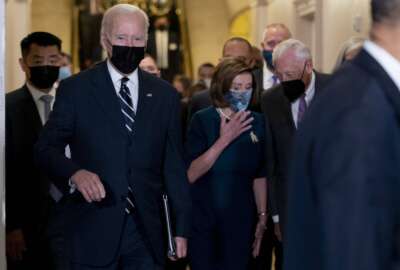Sated from Thanksgiving, Congress now has an expiring CR to deal with
Returning from its Thanksgiving recess, dealing with the budget is a top priority for both chambers of Congress.
Best listening experience is on Chrome, Firefox or Safari. Subscribe to Federal Drive’s daily audio interviews on Apple Podcasts or PodcastOne.
The continuing resolution under which the government has been operating since Oct. 1 expires this Friday. Returning from its Thanksgiving recess, dealing with the budget is a top priority for both chambers of Congress. The Federal Drive with Tom Temin got more details from Bloomberg Government Deputy News Director Loren Duggan.
Interview transcript:
Tom Temin: And Loren, is it safe to say that’s what they’re gonna really start taking up now, after they get over their languishing in tryptophan?
Loren Duggan: That’s really going to be the main focus this week, because it’s something they absolutely have to wrap up by the end of the week. They gave themselves about 11 weeks earlier this year to come to some sort of agreement on federal spending, and really haven’t made that much headway on the 12 regular appropriations bills that need to be done. So what we’re looking to see this week is an extension of the continuing resolution for at least some period of time to give them more negotiating room and perhaps even to figure out some of these other elements that are moving on Capitol Hill that could maybe right along with an omnibus eventually, or at least be you know, in this queue of work that they have to do to try and get all this work done before the end of the year when they’d like to get back home to their families for the winter holidays.
Tom Temin: Well, a couple of questions then, they wouldn’t tie the omnibus bill for regular government funding to the reconciliation bill, would they? Or could they?
Loren Duggan: They would not, no those two things are riding separately in part because that reconciliation bill is on its own process. And the way that that was advanced is so that they don’t need a supermajority in the Senate of 60 votes to advance that. They just need the bare majority of 50 votes to get that bill over the line, if they can all agree within their 50, that that’s a piece of legislation that they want to move forward. So that will definitely ride on its own. But there are other pieces of legislation that could hitch a ride on either the omnibus if they were able to come to agreement on that, or perhaps the defense authorization bill, which is another measure that the Senate at least is going to start this week looking at some procedural votes around that and trying to find a path forward on that legislation that’s considered must pass, but in a different way than the government funding that has this drop-dead point on Dec. 3 on Friday.
Tom Temin: So one question then would be how long the next CR goes. It could be the entire year as Mitch McConnell was threatening early on, or it could be day by day almost. Or sometimes I’ve seen them do, a few days at a time so they can get to that point.
Loren Duggan: That’s right. And the the brinksmanship comes into play here, right? So as the length of this extension is basically kicking the can and giving yourself a certain amount of time to negotiate a year-long CR isn’t palatable to most Democrats. It’s also not palatable to most federal agencies who wanted adjustments in their budget this year to reflect the changing realities, their staffing needs, whatever it may be, and also government contractors want some certainty, they don’t want a year-long CR, which may not have new starts or the kicking off of new programs that are initiatives that people really want to get involved in. So I would be very surprised if we saw a year-long CR as the opening bid here, probably some weeks to give themselves more room to negotiate, because they have a lot to work through. And it would take a long time to assemble an omnibus once they were ready to do so. But they’ll at least give themselves some breathing room if they can to keep the government open while they have this next round of talks on that.
Tom Temin: And getting back to the defense authorization bill, and you mentioned some procedural votes. What does that mean? And how soon could they get to the vote on the bill itself?
Loren Duggan: Well, if they can get the 60 votes needed to invoke cloture, or cut off debate, they could move pretty quickly. The procedural votes bogged down before they left for Thanksgiving, they were trying to move this forward. There is bipartisan support to take it up. But they couldn’t come to an agreement on a universe of amendments that they would limit the bill to when it came up on the floor. This bill attracts hundreds of amendments potentially, but they’re trying to make the debate manageable, come up with a list that they’d debate separately and have votes on on the Senate floor. They’re also working on a manager’s package, which would be things that everyone agrees to, they cobble those together and move that forward. So the vote tonight, I believe, is a motion to basically cut off debate on the substitute amendment, the Senate’s version of this bill, and there could be some more votes like that to come in the coming days. If they could reach agreement, they could set up something where they could probably knock it out in a number of hours having those votes. But if they have to drag it out and go through all the steps, it could take most of the week just to process that bill. And then they also have to deal with all the steps to getting a continuing resolution done by Friday night, which can be considerable as well.
Tom Temin: We’re speaking with Loren Dugan, deputy news director at Bloomberg Government. So basically, it sounds like “it” is in the Senate side because one the reconciliation bill which didn’t pass the House, and then they’ve also got the NDAA and that passed the House already too. So really, Mitch McConnell and Chuck Schumer are holding the hot potato here.
Loren Duggan: They really have a lot to deal with and not a lot of time. Floor time’s a precious commodity any time of year in the Senate, but especially right now with this combination of must-pass legislation and want-to-pass legislation. And then there’s little things that can be thrown into the works as well where some of the Senate Republicans would like to force a vote on the president’s vaccine mandate that came out, it’s been stayed by a court. And that legal proceeding is still underway. But there’s something called the Congressional Review Act that allows simple majorities in both houses to knock out a regulation. Now, I don’t think that would ever get to the point where the regulation would be felled as a result of this resolution, but the procedures at least allow Republicans to try to force a vote. But that takes up more floor time again and eats into that. But really, Mitch McConnell and Chuck Schumer’s relationship may be tested or even forged deeper in this period as they try to figure out a way to manage this amount of business, get done with their parties want them to do, and also let their members go home for the holidays. And you know, Mitch McConnell has to have a balancing act between expediting things he wants to see done, but not move too fast on things that his caucus doesn’t want to move forward. And I think the top one, there would be reconciliation, where they might not necessarily want to speed that up any faster than the rules already allow it to move.
Tom Temin: And then there’s the question of the debt limit, which would further drive apart the possibility that they’ll split an eggnog after this is all over?
Loren Duggan: Yes, absolutely. So they gave themselves some wiggle room on the debt limit earlier this year. The date is not a fixed date, it depends on how much the Treasury Department has on hand and how it can manage that cash flow. Treasury Secretary [Janet] Yellen said she thought sometime after Dec. 15 is when there would be a problem, but it wasn’t clear how soon, other estimates have that going maybe into next year. What’s the sticking point here as well, there was agreement to do that short term fix on a bipartisan basis. Most Republicans don’t want to help out the Democrats this time and want them to find a solution that’s a Democratic-only solution. So only Democratic votes. There could be a another round of budget reconciliation around that, that would take a little time, maybe they’d help speed that up. But we’re really going to be looking to see how that comes together in the next couple of weeks. Because the fear of the debt limit, that’s when markets get a little skittish, and investors in general get a little worried about that dynamic. But if there’s more time to deal with that, they might take it, but they also might try to find a way to again, package some of this stuff together. Because there’s so much to do, and not really that much time before the holidays are gonna beckon.
Tom Temin: I was gonna say there’s that little thing called Christmas coming pretty soon. And so what does their schedule look like beyond this week?
Loren Duggan: Well, they were originally only supposed to be in a couple weeks of December. But I think most people can see that’s probably not going to hold at this point, the what three Fridays from this coming. One is Christmas Eve itself, which is also a federal holiday, I would assume they’d be gone by then. And if they can be gone for the rest of the year, then but we’ll be watching for those kinds of announcements very closely, because that affects a lot of schedules around town just when Congress is in and when they’re going to go out. And then also a question will be when do they come back in January? Because there’s usually a schedule that comes out at some point, forecasting that and that’ll give a sense of when, if there is something left on the table that they can’t get to between now and Christmas that they could maybe take it up pretty early next year. So a lot of question marks hanging over December and then the beginning of 2022 as well.
Tom Temin: Yeah, Hark the Herald Angels sling epithets at one another is the way it is on Capitol Hill, I guess. Loren Duggan is deputy news director of Bloomberg Government. Thanks so much.
Loren Duggan: Thank you.
Copyright © 2024 Federal News Network. All rights reserved. This website is not intended for users located within the European Economic Area.
Tom Temin is host of the Federal Drive and has been providing insight on federal technology and management issues for more than 30 years.
Follow @tteminWFED






